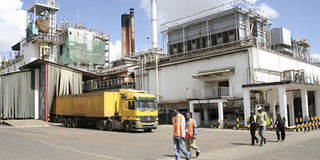How Ruaraka became beer hub of Kenya

East African Breweries Limited plant in Ruaraka, Nairobi on October 17 2012. Photo/PHOEBE OKALL
What you need to know:
- It was on the banks of this river that Charles and George picked an expansive site to construct Kenya’s first brewery in 1922.
- Interestingly, the two had not come to Kenya to build a brewery, and their entry into Ruaraka came after a frustrating gold prospecting venture that almost bankrupted them.
Until two brothers, Charles and George Hurst, got interested in the site, Nairobi’s Ruaraka area was a desolate bush, with a permanent river in the valley.
The river, known as Rui-Rwa-Aka, meaning women’s river, was reserved for Kikuyu girls during circumcision for its cold-morning anaesthetic waters.
It was on the banks of this river that Charles and George picked an expansive site to construct Kenya’s first brewery in 1922.
Interestingly, the two had not come to Kenya to build a brewery, and their entry into Ruaraka came after a frustrating gold prospecting venture that almost bankrupted them.
They had then tried flax farming, to no avail, while their coffee crop was devastated by hail. Ruaraka was to be their last experiment in enterprise in Kenya.
Always an entrepreneur, George had been a party animal in Nairobi’s newest hotel, The New Stanley, as well as the Norfolk, where he hobnobbed with other failed farmers, successful entrepreneurs, soldiers and game hunters.
It was at one of these parties — celebration marking the end of First World War — that he realised that the toasting was done using imported beer brought 6,000 miles by sea.
WHY NOT START A BREWERY?
A business idea – why not a start a brewery? - struck him was remarkably changed the face of one Nairobi’s unsettled areas.
Charles had, in between drinks, sold his idea to his brother George and one of their friends, H. A. Dowding.
The three then started inspecting possible sites and ended up in Ruaraka, which they liked. Besides having a permanent unpolluted river, the land beyond was undulating and teaming with wildlife.
Here, the three men contributed £2,500 each and Charles left for England to buy some brewing equipment. He loaded them onto a ship and sailed back to Mombasa.
Back in Ruaraka, a building of cut stone and corrugated iron was being constructed to start the brewery as the entrepreneurs lived in a tent on the cleared ground.
It was one of the first buildings in the area in 1922 and in Ruaraka, the first beer with a name was born and delivered to the New Stanley Hotel, where it received mixed reaction.
The Ruaraka enterprise almost came a cropper after George was killed by a rogue elephant while on a hunting mission.
It was in memory of his brother that Charles named the new beer Tusker. He also had the rogue elephant killed and took its tusk to the brewery.
But more than that, the story of Ruaraka, as an industrial hub, started. The entry of another brewery, Taylor and Company, in Ruaraka in 1938, sealed the area’s reputation as the cradle of beer brewing in Kenya.
The new brewery, founded by a Mr William Taylor, gave Kenya Breweries a run for its money amid financial problems.
However, it was in 1951, when Ind Coope and Allsopp (East Africa) Ltd bought a controlling interest in the brewery that the Pilsner and Allsopps brands entered the Kenyan market.
Later, Kenya Breweries would buy Allsops and Pilsner to form the East African Breweries at a time when the market was shrinking.
Another early entry in Ruaraka was Industrial Plant (East Africa) Ltd, which was founded to service the two breweries.
Initially, Baron U. Akerhielm from Copenhagen, Denmark, supplied the breweries with tanks hrough his company, Anton Petersen & Henius Ltd.
He soon realised that he could only meet the demand for tanks by investing in a plant in Nairobi. He established his first factory in Ruaraka 1960.
Industrial Plant (EA) Ltd enabled many pioneer industries in Kenya to mechanize and was instrumental to the growth of Ruaraka as an industrial hub.
Other industries started mushrooming around Ruaraka to serve the beer industry and over the years, it has become one of Nairobi’s distinct industrial centres thanks to the ingenuity of a failed farmer.



